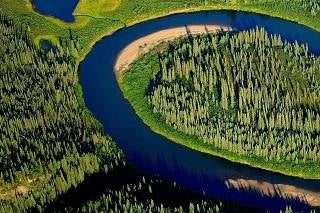Biden administration to halt major mining project over tribal hunting concerns
The project was set to go through the Arctic National Park and Preserve, a major piece of protected land in the northern half of the state

The Department of Interior is set to announce a ruling that would effectively halt a major mining development in Alaska over concerns that dozens of local tribes will be disrupted by the project.
The Biden administration was set to issue a “no action” ruling for the federal land previously set to be the site of Ambler Road, a proposed 211-mile industrial road deep through the Alaskan wilderness, multiple news outlets reported.
The project was set to go through the Arctic National Park and Preserve, a major piece of protected land in the northern half of the state.
The news could end a years-long battle between local tribes who opposed the project due to its impact on subsistence hunting, which is a major part of some tribal lifestyles across the state.
The project was also a controversial issue for the tribes as it was approved just days before Donald Trump left office by an Interior head who Politico found to have covered up environmental and tribal impacts studied as part of the planning process.
Now, it looks like the project is dead; the refusal of the federal government to allow construction of a road means there remains no plan for a supply chain to be set up to allow access to large copper and zinc deposits known as the Ambler Mining District in Alaska’s northwest. The minerals are key components in batteries and engines for electric vehicles.
The Tanana Chiefs Conference, a tribal group representing dozens of villages, had long fought the project and warned that the road and associated mines would “have devastating impacts on all fish in-migration and out-migration, spawning and rearing habitat, and will especially compromise species at risk like Chinook” due to the sheer number of rivers and estuaries the project would be expected to cross.
“The Ambler Road will pierce the heart of the hunting and fishing lands that our people have depended on for thousands of years,” reads a website the Conference set up in opposition to the project.
It continues: “The road alone would cause harmful impacts along 125 miles and 200,000 acres of public lands managed by the State in trust for its people. The Ambler Road project would be one of the biggest and most destructive in the State’s history.”
In a statement obtained by Politico, the company focused on the development of the mines and called the Bureau of Land Management’s (BLM) move “an unlawful and politically motivated decision”. It is expected to be challenged by a state agency, the Alaska Industrial Development and Export Authority.
The move was also condemned by Alaska’s entire bipartisan congressional delegation. Democrat Mary Peltola issued a lengthy statement calling the Biden administration’s ruling “disappointing” and writing that the resources were crucial for clean energy development — while also posing an economic opportunity in a region bereft of many.
“The Ambler Access Road is necessary to access the Ambler Mining District, the development of which could create new, good-paying jobs in a region of the state that has limited economic opportunity. Our nation relies on foreign governments for many of the critical minerals used in clean energy development, national security, and everyday electronics,” wrote the congresswoman.
“Alaska has a wealth of natural resources that can be responsibly developed to help boost domestic manufacturing and innovation, but we need to be able to access those deposits. In this time of heightened international and geopolitical conflict, we must not arbitrarily preclude Alaskans’ ability to access deposits like Ambler.”
The Interior Department’s final ruling is expected to be released later this week.
Join our commenting forum
Join thought-provoking conversations, follow other Independent readers and see their replies
Comments
Bookmark popover
Removed from bookmarks